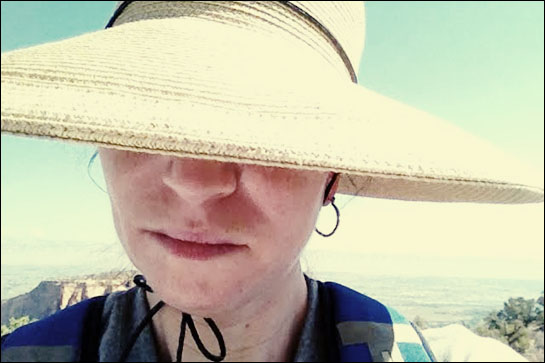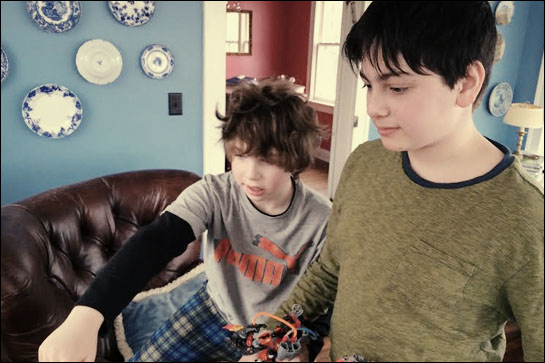I hate being the person with hindsight

Hindsight is so sucky. It was so much more fun to write about homeschooling when I was the deer-in-headlights parent who was so scared of making mistakes. In hindsight, I should have hired more people to give me advice. It’s so absurd that I didn’t. I notice that with things I’m great at — like managing my career, playing beach volleyball — I had no problem hiring lots of people to steer me. The idea of making even one wrong turn because of lack of guidance was so upsetting to me.
But as a homeschooler, I decided I could just read everything. I hired so few consultants. I think because I knew so little about it, I decided I could do it myself. This is a proven thing: we read more info about what we’re already good at. Like, if you are really good at productivity, then you read a lot about productivity. If you’re really good at nutrition, you read a lot about that. It’s not a chicken and egg thing, it’s an egg-chicken-egg-chicken-egg-chicken-egg thing. We just get stuck doing the stuff we’re good at and not doing stuff we’re not good at.
So it must also be proven — I’m proving it right now — that we hire consultants to help with what we’re good at. I think it’s because we can imagine what the help will be like. I understand what help with beach volleyball looks like. I can ask good questions and get good consultants. I was so lost with homeschooling that it was hard to even know who I could hire.
I see this with people who hire me for coaching. Everyone hires me for career coaching because they have had careers, and they understand how to ask career questions. But almost no one needs career coaching. (Right now I am about to kill my whole career coaching business, so if you were ever thinking of hiring me, go do that right now. Stop reading.)
Okay. So either you have a good career and people in your career are helping you, or you don’t have a good career and you should do something else. But it’s hard decide to not have a career, and it’s hard to know how to ask about that. So people just hire a career coach because that’s socially acceptable. This happens so often that I am shocked when someone genuinely needs career advice.
This is all to explain to you why I did not hire people to give me advice on how to homeschool. Well, I also didn’t want to hear the advice. Which, of course, is how people feel when I tell them they should just forget the whole career thing and focus on something else. We all hate realistic advice about an area where we are not high-achieving.
In hindsight, I should have hired a place that does college application consulting by starting really young and doing project-based learning with kids. But the projects are super-cool, memorable projects that go on college applications. Too often homeschoolers pat themselves on the back for project-based stupidity. We shouldn’t do that. Projects should have milestones and goals and hurdles, not just a fun way to pass time for parents. (Which is for another post, but really, so much of homeschooling is just so parents can do what they like. Myself included.)
Here are places that have great resources to hook your kids up with professors, professionals, experts who will help your kid become an expert and have something to show for it. And stop pretending you will learn right alongside your kid and become an expert. That’s not fair to your kid. Your kid should get to be with someone who knows more than you.
https://www.crimsoneducation.org/us/contact/
Go to that link and click on “Crimson Rise.” It will probably be really expensive. I’m sorry. I don’t know what to tell you. Homeschooling is expensive. But it’s not as expensive as private school. And it’s not as expensive as going to a mental institution from the drama of being in school-not-school, and on Zoom, and on not-Zoom, and teachers on strike, and not on strike etc.
Another place that has great resources for doing project-based learning:
https://ingeniusprep.com/
I know it seems weird to turn homeschooling into all college applications, all the time. But it makes sense when you look at the cost of really meaningful project-based learning: of course parents will only foot the bill for this when it’s related to college. Otherwise, parents aren’t used to paying to make education a great experience.
So really, this is my message: all the good homeschooling resources are project-based, and all the best project-based opportunities are with the college application consultants. The really big places, with a national or international presence, have many levels of support for a kid who wants to have deep, meaningful experiences before they leave home. The opportunities for these projects are narrow: between age 11, when a kid can handle it, and age 15, when a kid needs to start focusing on SATs.
So in hindsight, I regret not leveraging the resources these consultants offer during that period between 11 and 15. But there’s something comforting about regret: you can only pinpoint the things you regret if you feel like you did most of the other stuff in acceptable ways.



Years ago, you told me to stop reading stuff I know about and stop doing things I’m bad at that I can get others to do—good advice for deciding what to read, which podcasts to listen to, and where to spend money. As far as regrets, regreats can be helpful—a justifiable way to beat ourselves up! There must be a podcast about that.
I can’t agree with the idea that the purpose of childhood is to prepare for college. I find it impoverishing, mentally and emotionally. The purpose of childhood is to prepare for adulthood, for life. College is even shorter than childhood, and far less important. Sometimes, too, people who spend their childhood preparing for college seem to spend their college years acting like children.
Any kid who discovers that he would like to be a carpenter, an electrician, an EMT, a firefighter, etc. would be wasting tons of time and money not only in going to college but also in specifically preparing for college. Figuring out if college is a worthwhile use of a kid’s time is best done before that kid is pushed on to college by educational peristalsis and out the other end deeply in debt. Figuring out true interests, and how to pursue them, should differentiate homeschooling from school-based education.
I remember when my son went to Kindergarten, all students were instructed to appear in college logo Tshirts one day because they were “all going to college,” which I thought was not only untrue but unwise. Why repeat that at home?
I agree with the idea that kids around the age of eleven gain the ability to work on bigger projects. My son worked on a genomics project around that age, and got a lot out of it, and my eleven-year old is working on a book project right now at school. So I see the point in saying that around age eleven a kid may be ready for a change in focus or depth. But the idea that it should be college-focused? Nah. It’s just as well if my daughter’s project goes nowhere near her eventual college app (if she decides to go), and it’s much, much better if she embarks on it without that idea hanging over her head. Kids are anxious enough without saddling them with that starting at eleven.
Likewise, the idea that all kids need to prep for the SATs is absurd, and starting to do so at fifteen is preposterous. Kids who are going to do really well on the SATs will do so without any prep. Kids who are going to do poorly on the SATs can just go to a college that doesn’t require them.
The best use of SATs (and the reason I still support them) is for poor kids from bad schools to prove they’re really smart. Other than that, SAT scores are just more predictable, and hence discounted, data. Study all you want; whoever reads the numbers at the other end will know you did, and factor that in. Unless there’s a great mismatch with your background, your scores won’t mean anything to anybody. SATs just aren’t worth that much time, especially childhood time, that could be spent developing meaningful interests and abilities.
It’s a terrible bet to say that homeschooling should be based on college admissions from day one: the parent is betting not only that the point of her kids’ childhoods is that they should go to the best college possible, but that she knows now what the best colleges will want from incoming students a decade in the future… and, furthermore, that what they will want is hothoused kids in perpetual sales mode. Maybe ten years from now admissions counselors will say “Oh no, not another Crimson kid!”
PT and I both have one kid in higher education and one kid too young for it. So maybe I get to have a little hindsight too. Did I do everything right with my kid (who is currently enjoying his second year of college?) For sure no. Would it have been better for him to spend a lot of time (from age 11) doing lots of projects at a place like those linked to here, and then a lot of time (from age 15) prepping for the SAT? No, it would clearly have been pointless. If there’s something I could have done better, it’s not tell him what to do but listen to him.
Here’s the part I find the most confusing: to call it hindsight, you must be looking back and saying this expensive project cramming would have made things better for your college son right now. How would it be better? Would he be happier? Would he be better prepared at his current college? Would he be at a better college? What’s the hindsight?
You have another son who, if I understand things correctly, is very unlikely to attend a traditional college or university at all. How would Crimson projects and SAT prep be making his life better now if he’d started them at eleven and fifteen, respectively?
If there’s one piece of advice I’d feel bold enough to share with other parents, it’s this: be prepared for your kid to change his mind. My son has zigged and zagged through a number of different trajectories, and I think every wrong turn has been important. Most importantly, he has been the one driving.
Hm. Good questions. This is what I think I am saying. The purpose of childhood is to just enjoy childhood. And the purpose of education is to get into college to fit into the rest of society’s ranking system. So then family is about enjoying childhood and homeschool is about making sure the kid does not get left out of the ranking system – that is, the kid makes it to college.
People ask homeschoolers all the time what they learned. If you get a college degree no one ever asks you what you learned in homeschool. If you spend your childhood in school a lot of people would ask if you had a nice childhood. If you are at home your family can focus on having a nice childhood.
I’m thinking this way now. I might change later :)
At any rate, this is the genesis of me thinking the consultant is the most efficient way to go about homeschooling. More time for a nice childhood.
Penelope
I like this response. Enjoying childhood is important. I’d rather say, though, that the purpose of childhood is to learn how to be an adult. The education I see in that is less from books and more from other people. Sometimes kids who grow up really book smart get to adulthood really people stupid. Kids are learning machines, and the most important learning isn’t stuff adults plan for them, it’s the things they figure out on their own, for their own purposes. Learning that they can learn whatever they want to is number one.
I’m still uncomfortable with this sort of statement: “the purpose of education is to get into college to fit into the rest of society’s ranking system.” I just don’t see that. I don’t agree that all kids should go to college, and I’m not even sure about most. I can say without hesitation that I don’t think most kids should go K-12 and then straight to college. And I think the lion’s share of the education that a kid should perform has nothing to do with college prep.
Pushing the education part of homeschooling off to a consultant is outsourcing no less than sending your kid to a boarding school is. It may even cost more. Unless you think you’re a terrible role model, or are doing adulthood horribly, then the kids’ most important learning is from watching what you do and learning about what you did. But some people might think others would be better models. I tend not to think that teachers are the best models, but I don’t imagine I’d consider educational consultants to be better.
It is true that if you get a college degree nobody asks you what you learned in high school. I’m in a family where nobody finished high school, and it never comes up – people only care what the last qualification is, and high school isn’t an important qualification for anything. A kid can get a GED any time he wants, and whatever the real qualifications are, they don’t have to be college qualifications.
I get a bit uncomfortable whenever someone mixes efficiency with taking care of kids. Efficiency always means ignoring something.
It seems like you’re ideas around homeschooling have changed and evolved a lot over the years. You started out as an unschooler if I remember correctly. What are your thoughts on unschooling now? Do you agree with it up until a certain age or do you think it works best for a certain type of kid? And do you think the goal should always be to go to university or it depends on the kid?
Yeah, you’re right that my ideas have evolved. I guess that’s true. I think that they haven’t evolved a lot. It’s just that something I notice while I’m going through life is I don’t trust myself in the moment. So I hedge. All the time. Not just with my kids, but with everything. Like, when I did my first startup I wasn’t sure if I was actually employed or not. Or when I was writing my first magazine column I wasn’t sure if I was a writer or not. But I was actually doing great in both cases.
I think that might have been the case with the kids. Unschooling worked really well when I did it. Z had cello and he was really focused on that and I focused with him. So he was driving his learning in that he had a strong interest and I was helping him. But I think I eneded up neglecting Y for a few years. I told him to learn math online, which is stupid. It’s slow and inefficient and I only did that because it was easy and cheap. I also let him fend for himself alone on the farm when he could have had tutors and learned a lot more. There was no reason for him to be teaching himself and reading all day. It was a waste of time. I get upset thinking about it and so does he.
So I guess I just want to be really clear that unschooling isn’t neglect. It’s actually really hands on and a lot of work because if your kid isn’t demanding a lot of time and energy from you then the kid isn’t directing the learning and then you have to figure out how to help the kid direct. I didn’t do that. I was just sort of relieved that I got to have a break.
It’s not like he died or something from this experience. But it’s disingenous as a parent. And he and I talk about it a lot in the context of how I need to stop implying that unschooling is parents get a free pass. It doesn’t matter what the goal is for the kid — you need to keep the option of college open to the kid because in 7th or 8th or 9th grade they’re too young to decide they don’t want the option. They don’t know what it means — they only know it means they don’t have to do hard stuff. So they keep the option open. it won’t kill them. Then, when they get accepted, they don’t have to go.
Penelope
Penelope